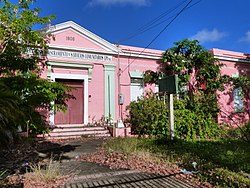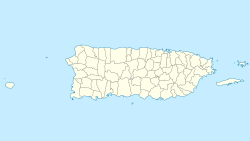Antonin Nechodoma (1877–1928), was a Czech architect who practiced in Puerto Rico and Dominican Republic from 1905 to 1928. He is known for the introduction of the Prairie Style to the Caribbean and the integration of Arts and Crafts elements to his architecture. Nechodoma designed in such style at the historical district of Miramar, Puerto Rico where the town preserves his creation.

The University of Puerto Rico School of Law is the law school of the University of Puerto Rico, the only law school in the University of Puerto Rico System and the only public law school in Puerto Rico. It was founded in 1913 at its present site in Río Piedras, which at the time was an independent municipality and is now part of the City of San Juan. The School of Law has been accredited by the American Bar Association since 1945 and has been a member of the Association of American Law Schools since 1948.
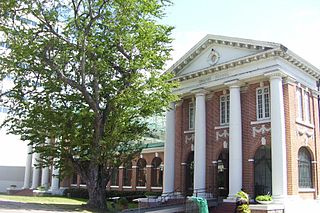
The Puerto Rico Museum of Contemporary Art, often abbreviated to MAC, is a contemporary art museum in Santurce, Puerto Rico.

This is a list of properties and districts in the southern municipalities of Puerto Rico that are listed on the National Register of Historic Places. It includes places along the southern coast of the island, and on the south slope of Puerto Rico's Cordillera Central.

The Asilo de Ancianos de Mayagüez, also known as Asilo De Pobres or Asilo Municipal, is the name of a historic Classical Revival style building located in downtown Mayagüez, originally as a shelter for the homeless, poor and disabled of the city.

The Logia Adelphia is a historic building located in Mayagüez, Puerto Rico. It was built in 1912, and was designed by Sabas Honore, a prominent local architect. It was listed on the U.S. National Register of Historic Places, for its architecture, in 1986. The north facade, facing on the street, is elaborate and preserved. The interior has been renovated, and no longer reflects its original design.

This is a list of properties and districts in the western municipalities of Puerto Rico that are listed on the National Register of Historic Places. It includes places along the western coast, and on islands, and on the western slope of Puerto Rico's Cordillera Central.
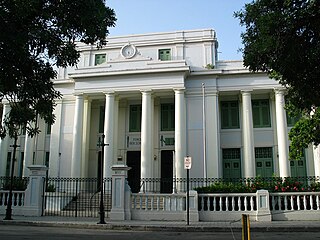
The Ponce High School is public educational institution in Ponce, Puerto Rico, offering grades nine through twelve. The school's main building is a historic structure located on Cristina Street, in the Ponce Historic Zone. From its beginning the school has secured a unique place in Puerto Rico's educational history. Of over 3,000 schools erected in Puerto Rico in the first quarter of the twentieth century, Ponce High was the largest, "at a time enrolling more students than all the other Puerto Rico high schools combined", and for many years enrolling more students than any other high school in Puerto Rico. The cost of the building in 1915 dollars was $150,000 USD. The building was listed on the U.S. National Register of Historic Places on 4 August 1987. The school has the only diamond-level DECA chapter in Puerto Rico. The Ponce High School building is "among the most important public buildings ever built in Puerto Rico." The school is the oldest continuously-operating high school in Puerto Rico.

Albergue Caritativo Tricoche or Hospital Tricoche is a historic building located on Calle Tricoche street in Ponce, Puerto Rico, in the city's historic district. It was designed by the Spanish Royal Corps of Engineers. The architecture consists of 19th-century civil architecture. When built in 1878, "it held the top spot among public building in Puerto Rico," based on its size and beauty.

The Antiguo Cuartel Militar Español de Ponce or El Castillo is the only structure directly related to the events of the land defense of Puerto Rico during the 1898 American invasion of the Island. The historic building dates from 1894 and is located on Calle Castillo in Ponce, Puerto Rico, in the city's historic district. The structure was listed on the U.S. National Register of Historic Places on 14 May 1987.
Alfredo Wiechers Pieretti was a Puerto Rican architect from Ponce, Puerto Rico. He was an expositor of the Neoclassicism and Art Nouveau architectural styles, doing most of his work in his hometown of Ponce. Today, Alfredo Wiechers' city residence, located in the Ponce Historic Zone and which he designed himself, is a museum, the Museo de la Arquitectura Ponceña. After enriching his hometown city with some of the most architecturally exquisite buildings, he moved to Spain arguing political persecution by the authorities in the Island.

The Cementerio Municipal de Mayagüez, also known as Cementerio Viejo, was constructed in 1876 in Mayaguez, Puerto Rico. It was designed by the municipal architect Félix Vidal d’Ors following the master plan for the city from 1804. The outskirts of the cemetery are defined by brick walls and niches, the area is divided by two streets that intersect. Following an 1872 law the cemetery provided separated areas intended for non-Catholics and for the poor, located in the east.

The School of Tropical Medicine, was an educational institution created in 1926 by an act of the Puerto Rican Legislature, to further the research initiated by the Anemia Commissions and the Institute of Tropical Medicine on anemia and its causes. The institution existed as an independent entity until 1949, when it was integrated into the School of Medicine of the University of Puerto Rico.
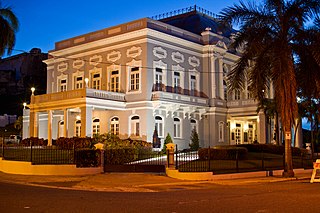
The Antiguo Casino de Puerto Rico, located at Avenida Ponce de León 1 in San Juan, Puerto Rico, is a Beaux Arts architecture style building dating from 1917. It was listed on the National Register of Historic Places in 1977, and on the Puerto Rico Register of Historic Sites and Zones in 2000.

The Biblioteca Carnegie on Avenida Juan Ponce de León in Puerta de Tierra, San Juan, Puerto Rico is a NRHP-listed Carnegie library funded through a $100,000 donation from the Carnegie Foundation, becoming Puerto Rico's first purpose-built library when it was completed in 1915.

The Daniel Webster School, also known as Escuela Daniel Webster and as La Webster, in Peñuelas Pueblo, Peñuelas, Puerto Rico, was built in 1927 and expanded in 1934. It was listed on the National Register of Historic Places in 2012.
Francisco Gardón Vega was an architect born in Puerto Rico.

The Padre Nazario School is a historic public school in Guayanilla, Puerto Rico. Completed in 1926, it epitomizes the monumental schools built in Puerto Rico during the early 20th century. Its Neoclassical and Spanish Revival details at the entry and spatial sequence of the vestibule are exceptional design features. It is named for José María Nazario y Cancel, a long-serving and prominent priest of the Guayanilla parish and discoverer of the Nazario Collection of ancient carved stones.

Eugenio María de Hostos School is a historic early 20th century school located in Las Marías, Puerto Rico.

Brambaugh School, officially the Dr. Martin Grove Brumbaugh School but better known today as Puerta de Tierra Public School, is an early 20th-century historic school building located in the Puerta de Tierra historic district in the city of San Juan, Puerto Rico. The school was built in 1913 by Frank B. Hatch based on designs by architect G.R. Gilmour and named after the first Education Commissioner of Puerto Rico Martin Grove Brumbaugh. It was the first modern school to be built in the Puerta de Tierra area of San Juan Antiguo and, until the construction of the neighboring José Celso Barbosa Graded School, it was the only school in the area. Brambaugh School continues to be an important public education center for the local community today.
